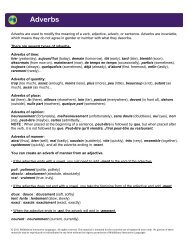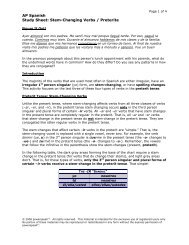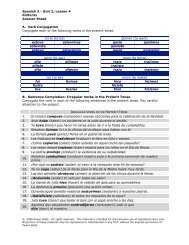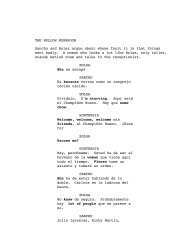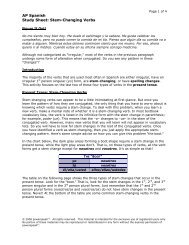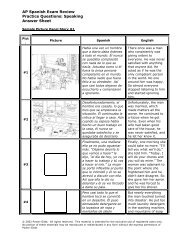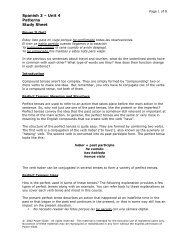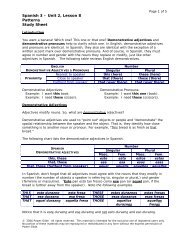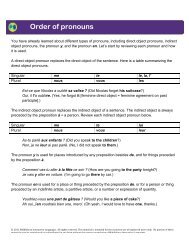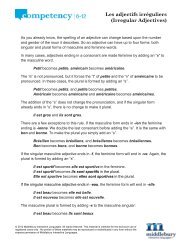A Palette of Verbs for Creating Stories
A Palette of Verbs for Creating Stories
A Palette of Verbs for Creating Stories
Create successful ePaper yourself
Turn your PDF publications into a flip-book with our unique Google optimized e-Paper software.
98<br />
A <strong>Palette</strong> <strong>of</strong> <strong>Verbs</strong> <strong>for</strong> <strong>Creating</strong> <strong>Stories</strong><br />
Instructions: Use these verbs to create Latin stories <strong>of</strong> your own.<br />
1st Conjugation <strong>Verbs</strong> Associated English Words<br />
altercare argue, quarrel altercation<br />
auscultare listen auscultation<br />
celebrare to celebrate celebrate<br />
contaminare contaminate contaminate<br />
captare capture captive<br />
condemnare condemn condemn<br />
continuare continue<br />
creare create creator, creature<br />
divinare to guess to divine, guess<br />
eradicare uproot, destroy, eradicate eradicate<br />
excitare wake someone up excite<br />
explorare explore explore<br />
ignorare <strong>for</strong>give, disregard, ignore ignore<br />
infuriare infuriate furious, infuriate<br />
invitare invite invite<br />
insultare insult insult<br />
mutare change immutable, mutation<br />
navigare sail navigate, naval<br />
observare observe observe<br />
optare choose, opt opt<br />
postulare demand, ask postulate<br />
pugnare fight pugnacious, pugilist<br />
recusare refuse refuse (but with c instead <strong>of</strong> f)<br />
spectare watch, look at spectator<br />
sperare to hope, despair (lack <strong>of</strong> hope)<br />
tolerare tolerate tolerate, intolerable<br />
vexare annoy, bother vex<br />
2nd Conjugation <strong>Verbs</strong> Associated English Words<br />
absorbëre swallow, devour absorb<br />
abolëre destroy, abolish abolish<br />
cavëre beware <strong>of</strong>, avoid caveat<br />
delëre destroy delete, deleterious, displease<br />
docëre teach doctrine, docile<br />
dolëre ache, be in pain dolorous<br />
exercëre exercise, train exert, exercise<br />
exhibëre exhibit, display exhibition<br />
favëre to favor favor<br />
gaudëre rejoice<br />
inhibëre hold back, inhibit inhibit<br />
invidëre hate invidious<br />
jacëre lie down adjacent (lying next to)<br />
latëre lie hidden, lurk, hide latent<br />
manëre/remanëre remain, stay remain, remnant<br />
permanëre last out permanent<br />
270
merëre deserve, merit merit<br />
miserëre pity misery<br />
monëre warn monitor, admonish<br />
mordëre bite mordant/mordent<br />
movëre move move<br />
nocëre harm, injure noxious<br />
obtinëre obtain obtain<br />
parëre obey, appear [when called]<br />
apparëre appear apparent<br />
persuadëre persuade persuade<br />
placëre please, give pleasure to placate<br />
displicëre displease displease<br />
prohibëre prohibit, hinder prohibit<br />
respondëre answer respond, responsible<br />
ridëre laugh ridicule, ridiculous<br />
subridëre smile sub-laugh = smile<br />
sedëre sit sedentary, sediment<br />
praesideo sit in front, preside preside, president<br />
tenëre hold, grasp tenacious, untenable<br />
continëre contain<br />
obtinëre obtain<br />
retinëre keep, retain<br />
sustinëre sustain<br />
timëre to fear, be afraid <strong>of</strong> timid, timorous<br />
terrëre frighten terrorize, terrified<br />
deterrëre frighten <strong>of</strong>f, scare away deter<br />
urgëre to urge on, put pressure on urge<br />
valëre be strong, valid valid, value<br />
praevalëre prevail, be stronger prevail<br />
vidëre see video, visible<br />
providëre <strong>for</strong>esee, provide <strong>for</strong> provide<br />
vovëre vow vow<br />
3rd Conjugation <strong>Verbs</strong> Associated English Words<br />
bibere drink beverage, imbibe<br />
cadere fall cadence, cadenza<br />
caedere fell, cut down, kill insecticide, fratricide<br />
canere to sing, canary<br />
cedere yield, move, go defend, defense<br />
procedere go <strong>for</strong>ward, proceed proceed<br />
recedere recede, retreat recede<br />
compellere compel, <strong>for</strong>ce compel<br />
defendere defend defend, defense<br />
desistere de to cease from, stop desist<br />
dicere say dictate, predict, contradict<br />
ducere lead, conduct conduct, induce, educate<br />
educere lead out educate<br />
deducere lead down or <strong>of</strong>f deduce, deduct<br />
emere buy emporium<br />
frangere smash, shatter frangible, fragile, fragment, fraction<br />
incendere set on fire incendiary<br />
incipere begin, start incipient<br />
invadere invade invade<br />
legere read legible<br />
271
ludere play interlude, prelude, post-lude<br />
mittere send transmit, intermittent<br />
parere to obey obey one's parents<br />
persuadere to persuade persuade, persuasion<br />
ponere put, place postpone<br />
proponere put <strong>for</strong>th, propose propose<br />
rumpere break, burst, split rupture<br />
e-rumpere break out, erupt erupt<br />
inter-rumpere interrupt interrupt<br />
ir-rumpere break in, attack<br />
struere pile up strew<br />
con-struere construct construe, construct<br />
obstruere obstruct obstruction<br />
de-struere destroy, bring down destroy, destruction<br />
suggerere to suggest suggest<br />
vendere sell vendor<br />
vincere conquer, vanquish invincible<br />
vivere live, be alive revive, vivid<br />
3rd Conjugation -io <strong>Verbs</strong> Associated English Words<br />
concipere conceive, imagine concept<br />
facere make, do factory, manufacture, confection<br />
fugere flee fugitive<br />
excipere except, remove except<br />
recipere receive recipient<br />
incipere begin incipient<br />
icere hit, strike<br />
jacere throw eject, inject, object<br />
rapere snatch, seize raptor, rapacious<br />
eripere rip <strong>of</strong>f, snatch away, steal<br />
4th Conjugation <strong>Verbs</strong> Associated English Words<br />
audire hear audio, auditorium<br />
convenire assemble, convene convene, convent<br />
dormire sleep dorm, dormant<br />
obdormire fall asleep<br />
oboedire obey obedience<br />
punire punish punitive, impunity<br />
partire share part, impart<br />
scire know omniscient, science<br />
nescire not know nescience<br />
venire come venue<br />
advenire arrive, come to (a place) advent<br />
evenire come out, result event, eventuate<br />
invenire come upon, find invent<br />
convenire come together, convene, assemble convene<br />
curcumvenire come around, surround circumvene<br />
272
TRANSLATION EXERCISE<br />
Instructions: Examine the sentences below. Then cover the English and translate from the Latin. Then<br />
cover the Latin and translate from the English.<br />
Plautus et Julius sunt pueri parvi. Plautus and Julius are little boys.<br />
Frequenter unä ludunt. They play together frequently.<br />
Die uno, Plautus jacit lapidem ad Julium. One day Plautus throws a rock at Julius.<br />
Julius iratus est, et Plautum icit. Julius is angry and hits Plautus.<br />
Plautus effugit. Super lecto suo jacet domi Plautus flees. He lies on his bed in his house<br />
suo et lacrimat. and cries.<br />
Tristis est, valde tristis, et valde iratus. He is sad, very sad, and very angry.<br />
icit sibi: Debeo punire Julium. He says to himself: I must punish Julius.<br />
Epistulam igitur scribit. So he writes a letter.<br />
In illä epistulä, condemnat Julium. In that letter he condemns Julius.<br />
Deinde jacet in lacto et obdormit. Then he lies down in bed and falls asleep.<br />
Dum dormit, constituit non mitteree pistulam. While he sleeps, he decides to not send the letter.<br />
Novam epistulam scribat in quo dicit: Instead he writes a new letter in which he says:<br />
Culpa mea. [it was] my fault.<br />
Potes mihi ignoscere? Rogo ut mihi ignoscas. Can you <strong>for</strong>give [to] me? I beg you to <strong>for</strong>give me.<br />
Julius amico suo ignoscit, et pueri denuo Julius <strong>for</strong>gives his friend, and the boys play<br />
unä ludent feliciter. happily together again.<br />
Using what you've learned, and with help from the palette <strong>of</strong> verbs <strong>for</strong> creating stories, create at least three<br />
narratives, dialogs or stories <strong>of</strong> at least eight sentences in length.<br />
PAST TENSE<br />
Although Latin verbs in the perfective and imperfective aspect have different meanings, they are <strong>of</strong>ten<br />
translated by an English verb in the past tense. It will be useful to indicate the different aspects in a distinctive<br />
way when we reference Latin to English. We will do this as follows:<br />
-ed 1 IMPERFECTIVE<br />
-ed 2 PERFECTIVE<br />
1. walk-ed 1 Ambulabam ad scholam. I [customarily] walked to school.<br />
2. walk-ed2 Ambulavi ad scholam. I walked to school (referring to a single trip).<br />
The term preterit or preterite is <strong>of</strong>ten used in place <strong>of</strong> perfective.<br />
QUIZ<br />
Instructions: Indicate the aspect <strong>of</strong> these sentences, either perfective (P) or imperfective (I).<br />
___1. I baked a cake <strong>for</strong> you. ___2. I was baking a cake.<br />
___3. I swam to the raft. ___4. I swam and swam.<br />
___5. I worked to earn money <strong>for</strong> school. ___6. I worked at the airport.<br />
___7. I used to work as a journalist. ___8. I worked until they released me.<br />
___9. I worked the puzzle in 10 minutes. ___10. I went to Rome once last year.<br />
___11. I went to Rome twice last year. ___ 12. I sang a song.<br />
ANSWER KEY<br />
1-P 2-I 3-P 4-I 5-I 6-I 7-I 8-I 9-P 10-P 11-I 12-P<br />
273
postulare (1st conjugation)<br />
Quod postulavisti, Brute? Nihil postulavi. What did you demand, Brutus? I demanded nothing.<br />
Et quod postulavimus? Nihil postulavistis. And what did we demand? You demanded nothing.<br />
postul - a - vi - sti<br />
root stem vowel past marker 2 2nd per. sg. marker<br />
audire (4th conjugation)<br />
Quod audivisti, Gaie? Nihil audivi. What did you hear, Gaius? I heard nothing.<br />
Quod audivistis? Nihil audivimus. What did you (pl) hear? We heard nothing.<br />
Quando venisti? Hodie mane veni. When did you come? I came this morning.<br />
Quando venistis? Hodie mane venimus. When did you come? We came this morning.<br />
aud - i - vi - sti you heard<br />
root stem vowel past marker 2 2nd per. sg. marker<br />
ven - i - sti you came<br />
root past marker 2 2nd per. sg. marker<br />
monëre (2nd conjugation)<br />
Quando me monuisti? Heri te monui. When did you warn me? Yesterday I warned you?<br />
Quando me monuistis? Heri te monuimus. When did you (pl) warn me? Yesterday we warned you?<br />
vidëre (2nd conjugation)<br />
Quem vidisti? Nullum vidi. Who(m) did you see? I saw no-one.<br />
Quem vidistis? Nullum vidimus. Who(m) did you see? We saw no-one.<br />
mon - ui - sti you warned<br />
root past marker 2 2nd per. sg. marker<br />
vid - i - sti you saw<br />
root past marker 2 2nd per. sg. marker<br />
THIRD CONJUGATION (VINCERE, DICERE, TRANSMITTERE)<br />
Veni, vidi, vici. I came, I saw, I conquered. (famous words <strong>of</strong> Caesar)<br />
Vicistis? Vicimus. Did we conquer? We conquered.<br />
Vicisti? Vici. Did you conquer? I conquered.<br />
274
Quod dicsi, dicsi. What I have said, I have said (and there's no changing it).<br />
Quod dicsimus, dicsimus. What we have said, we have said.<br />
vic - i - sti you conquered<br />
root past marker 2 2nd per. sg. marker<br />
dic - si - sti you (have) said<br />
root past marker 2 2nd per. sg. marker<br />
transmi(tt) - si - sti you (have) transmitted<br />
root past marker2 2nd per. sg. marker<br />
275



